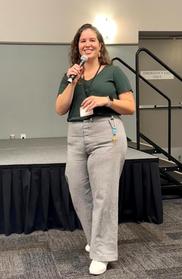 During the California Independent Booksellers Alliance annual meeting and town hall Wednesday morning, in South San Francisco, Calif., executive director Hannah Walcher announced that the association had "grown significantly this year" with the addition of 33 new stores, bringing the total number of CALIBA member stores up to 191.
During the California Independent Booksellers Alliance annual meeting and town hall Wednesday morning, in South San Francisco, Calif., executive director Hannah Walcher announced that the association had "grown significantly this year" with the addition of 33 new stores, bringing the total number of CALIBA member stores up to 191.
Walcher added that since May of last year, CALIBA staff have visited 91 of the association's member stores and hope to eventually visit them all. "It's truly been an amazing experience to see all of the hard work you're doing," Walcher said.
Mary Williams, general manager of Skylight Books in Los Angeles, Calif., and president of the CALIBA board, said the Golden Poppy book awards constituted a "growing area for us," and reported that the association was working on a mentor and mentee program. She also highlighted some of the lesser-known benefits of membership, including reimbursement for courses at the Professional Bookseller School.
 |
|
| CALIBA executive director Hannah Walcher | |
She took a moment to thank attendees for "showing up in person to CALIBA." By showing up together to support the regional, Williams continued, California booksellers can show the rest of the country, particularly New York, "how vibrant and talented this community of booksellers is." And that, she hoped, might convince publishers to "give us some extra points" and maybe even "build a warehouse west of the Mississippi."
Touching on the association's financials, board secretary Zack Dubuc, operations and logistics manager at Book Passage in Corte Madera and San Francisco, Calif., said income from the fall trade show has "bounced back dramatically" from 2024 and is also above 2023. Income from the holiday catalog is projected to be even while member outreach is projected to be ahead; dues are also up 27%. Outlining expenses, Dubuc explained that payroll was projected to increase about 12% due to increases in staff hours, website expenses were projected to drop by about 30%, and office expenses would stay about the same.
At the start of the meeting's town hall portion, Williams reminded attendees that CALIBA will be hosting a virtual town hall focused on Barnes & Noble's acquisition of Books Inc., noting that "such a large B&N expansion in our region" has naturally caused some anxiety.
For the most part, discussion during the town hall meeting focused on the rising price of books and the effect of economic uncertainty on consumers.
Addressing the rising costs of books, American Booksellers Association CEO Allison Hill remarked that one contributing factor is that book prices over the preceding few years had not increased at the same rate of inflation, and there is a "little bit of catching up" going on. At the same time, while books are excluded from tariffs, things like ink have been impacted, which has led publishers to increasing prices. A number of publishers have also announced a "hard first half of 2025," and it remains to be seen whether prices will "level off" or continue to rise. Hill said she believes that "a lot rides on fourth quarter."
When it comes to communicating with customers about price increases, board member Claire Bone, owner of Wild Sisters Book Company in Sacramento, Calif., emphasized that "costs are up everywhere" and "we can't hide from it" even though some community members may not appreciate hearing that Trump's tariffs are responsible. Vanessa Martini, board member and head buyer at Green Apple Books in San Francisco, Calif., said that it is a good time to talk to customers about how dollars spent at an indie bookstore will stay in the community, and it was "worth pointing out that we can't set prices."
On the subject of consumer confidence and spending, Bone said she leans more heavily into used books when "stuff like this happens," and when ordering new titles, she'll think twice about ordering $35 hardcovers. She also called it a "great opportunity" to get to know backlist titles and less popular authors, and she recommended carrying inexpensive children's sidelines like GEDDES. Williams pointed out that remainders are a good option for stores that don't carry used books. --Alex Mutter

